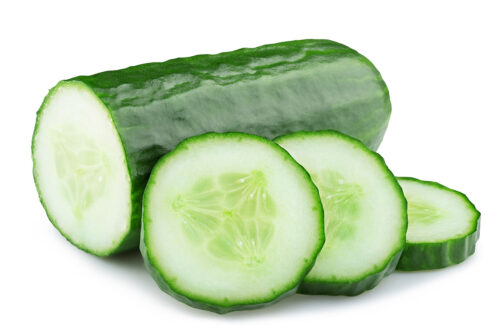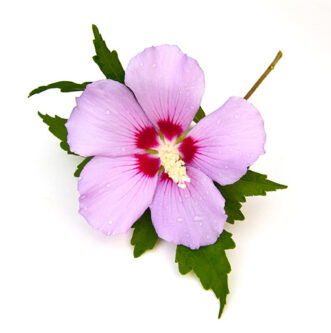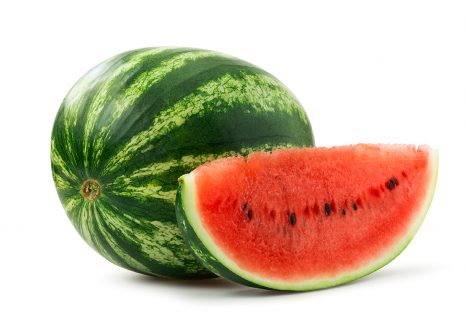September is the time of year that “Summer Heat” often arises because it’s either extra hot this time of year or else the accumulation of heat throughout the summer months creates imbalances now. Fortunately, many herbs that clear Summer Heat are especially available in our gardens or stores now as well, such as cucumbers and watermelons.
What Is “Summer Heat”?
Summer Heat itself refers to a particular acute condition arising from over-exposure to hot conditions, very similar to heat exhaustion, with symptoms of profuse sweating, fever, irritability, diarrhea, dysentery, sunburn, sunstroke, exhaustion, and extreme thirst. I once experienced the beginning stage of these symptoms when assembling a bench outside for a party in over 100 degree heat. Not smart.
While many of these symptoms present during the acute stage, when heat accumulates in the body over time it’s possible for that heat to move deeper inside where it turns into latent heat, causing symptoms throughout the rest of the year. That means regardless of any Summer Heat symptoms you may or may not have, if you feel a bit extra hot now, taking some herbs that clear Summer Heat are beneficial to prepare for fall and winter.
Herbs that clear Summer Heat most resemble refrigerants in Western herbalism, possessing a strong cooling and often refreshing nature. They usually have diuretic, diaphoretic or alterative properties. In Ayurveda, as with other anti-heat herbs, they help ameliorate Pitta and Kapha, but may increase Vata.
One of the best herbs for clearing Summer Heat as well as heat in general is the mung bean. It is especially beneficial when eaten in kicharee, a type of dahl combining, (in this case) mung beans, turmeric, cumin, and coriander. This may be served with rice and eaten with vegetables and added protein if desired, both as a snack or an entire meal. Many fast on just this dish alone for one to seven days as needed. To clear heat at the end of summer with symptoms of irritability and thirst, eat it once a day for a week.
Other herbs that clear Summer Heat include field mint leaf, flatbean seed, gardenia fruit, hound’s tongue leaf, jewelweed herb, lotus leaf, mung bean, red clover flower, southernwood leaf/common wormwood leaf, sweet wormwood herb, and soybean sprouts.

Cucumber Fruit, Seed Cucumis sativus
Cucumber is not only wonderful in salads, or even as a “salad” itself throughout the summer, but it’s also useful to prevent heat accumulation in the body throughout this season. Its fruit and seed counteract Summer Heat, clear the skin (treating acne), and promote fluid elimination. Its high silicon content also helps hair growth and connective tissues.
Cucumber Fruit, Seed Cucumis sativus
Energy and flavors: Cool, sweet
Organs and channels affected: Heart, Stomach
Chemical constituents: 96% water, high content of silicon and sulphur; potassium, magnesium, vitamins A, B, C, carbohydrates
Properties and actions: Refrigerant, alterative, diuretic; clears Summer Heat
Contraindications: Cold conditions
Dosage and preparation: 15-30g raw cucumber; 1 cup of the fresh juice

Hibiscus Flower, Root Bark, Leaf Hibiscus syriacus
- syriacus is the species that specifically treats Summer Heat symptoms as it has a beneficial demulcent and nutritional value as well as anti-toxin action for ulcers and intestinal problems such as infections, diarrhea, amoebic dysentery, bloody stools, colitis, and hemorrhoids.
- sabdariffa, also called “roselle,” is the common tea used as a cooling and refreshing beverage in North America. As a strong antioxidant, it protects the liver and kidneys. It is used for upper respiratory tract infections, fever, thirst, and as a mild diuretic. Drinking hibiscus tea throughout the summer can prevent heat accumulation the rest of the year.
Hibiscus Flower, Root Bark, Leaf Hibiscus syriacus
Energy and flavors: Cool, sweet, bitter, pungent
Organs and channels affected: Lung, Intestine
Chemical Constituents: Mucilage, carotenoids, sesquiterpenes, anthocyanidins
Properties and actions: Alterative, astringent, emollient, vermifuge, antiphlogistic, hemostatic; clears Summer Heat
Caution: High doses may be laxative.
Contraindications: None noted.
Dosage and preparation: Infusion, 5-10g. Tincture (root bark: 1:5 @60-75% ABV; flower bud/leaf: 1:2 @50%ABV fresh; 1:5 @50%ABV dry), 20-60 drops TID.
 Watermelon Fruit, Rind, Fresh Juice, Citrullus lanatus, C. vulgaris
Watermelon Fruit, Rind, Fresh Juice, Citrullus lanatus, C. vulgaris
Who doesn’t love watermelon? And to know it’s doing your body a favor by clearing excess heat makes every bite even more enjoyable. Interestingly, watermelons ripen this time of year, making them a perfect choice for clearing accumulated heat fromt eh body.
Watermelon generates fluids with symptoms of strong thirst, dry heaves, irritability, fever, dark, scanty urination, jaundice, and hepatitis. The rind is not as cooling as the fruit and is more diuretic., but it’s used for edema from Summer Heat and jaundice with dark urine. Watermelon seeds are used as a diuretic. In Ayurvedic medicine, it’s recommended ot eat some seeds with the fruit to prevent water retention.
A note of caution here about watermelon: because it has a cold energy, it can create coldness in the body if eaten/drunken to excess or in colder months. That means drinking watermelon juice in the winter is a great way to douse your inner body fires and cause coldness, diarrhea, poor metabolism, and low energy.
Watermelon Fruit, Rind, Fresh Juice, Citrullus lanatus, C. vulgaris
Energy and flavors: Cold, sweet
Organs and channels affected: Heart, Stomach, Bladder
Chemical constituents: Citrulline, betaine, arginine, lycopene, phytofluene, Vitamin C, bromine, fructose, dextrose, sucrose, malic acid, phosphoric acid.
Properties and actions: Diuretic, refrigerant; clears Summer Heat, drains Dampness, clears Damp-Heat
Caution: In those with coldness or weak digestion
Dosage and preparation: Fresh juice, 1 cup. Decoction, 15-30g.

Hibiscus is also effective for treating hypertension.